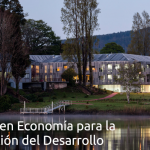Economics for Development & Planning | University Austral de Chile
The Master in Economics for Development Planning at the Universidad Austral de Chile is an academic program in Economics with an applied approach to development planning, which delivers theoretical and practical tools to study and promote sustainable development at the local, regional, and national levels, from a critical perspective.
How does the programme provide content to ensure students achieve an understanding of a reasonably diverse set of perspectives on understanding economies?
Although no specific course on the history of economic thought is offered, many courses offer this historical background within their specific topics. For instance, the first semester's course "Theories and strategies for economic development" covers the thought of development from Adam Smith to Latin American Dependency Theory, passing through other usual schools of thought like Neoclassical, Marxism, Structuralism, Feminism, etc. Similarly, the course "Economics and planning on a human scale", a flagship course in our department, focuses particularly on the unique thought of Manfred Max-Neef (the Chilean economist and winner of the Right Livelihood Award, in 1983), which ideas have been sometimes encapsulated under the term "eco-anarchism". Courses on ecological issues also go through different stages of theories and their contexts.
How does the programme ensure students understand the interaction between economic and ecological systems?
The Institute of Economics at the Universidad Austral de Chile has a long tradition of bringing ecological concerns at the forefront of Economics' teaching, partly due to Manfred Max-Neef's own efforts on this regard. The Institute has another Master Program which focuses directly on the interplay between the ecological and economic spheres. This Master Program builds from there to focus the attention in development planning - that is, to the theoretical and applied spheres of sustainable development at the local, regional, and national levels. The list of courses reveals this deep ecology foundation, with several courses directly addressing environmental and ecological issues directly. The background and research of academics involved in the program is also evidence of such foundation.
How does the programme ensure students understand how to critically explore real-world evidence, both qualitative and quantitative?
The programme addresses relevant and current problems of interest like the accelerated growth of mega-cities, the conflict between economic development and environmental protection, recent changes in inequality. There is space for students to bring their own experience and context to the classes too. The programme has one course on quantitative research methods and another course on qualitative methods. The program also has a course focused on fieldwork (titled "Research and development planning workshop") where students immerse themselves in a local institution (usually public) with the aim of having a hands-on approach to real world issues. This practical experience, combined with the methodological tools learned earlier help students to address a real-world problem of their interest in the compulsory thesis at the end of the programme.
What pedagogical approaches does the programme use to ensure that students examine the historical context, assumptions and values in all economic thinking?
It was mentioned above that students are exposed to a diverse and often competing set of theories and ideas. These theories are presented in their particular historical context, which is key to understand why (and from whom) they emerged in the first place. But perhaps most importantly, given the specific focus the programme puts on regional and local issues (with several courses directly on the topic, both theoretical and applied to planning and development), students have a direct opportunity to question question the contextual relevance of theories covered, since they were produced in different conditions to the local and regional conditions they are experiencing and evaluating in their applied work. This confrontation of theory with reality, embedded in the nature of the programme, is essential for any critical analysis.
How does the department ensure that the teaching culture and capacity to deliver economic pluralism are continually improving?
The department and the Institute have since long being committed to an open and plural teaching culture. That is one of its distinct characteristics. Thus, we can confidently assert we are the most pluralistic department in the country. As such, we are constantly looking to develop this distinctiveness. Our interest in being part of the new Economic Pluralist Master Programme database is an example of this. We are also committed to interdisciplinarity (or rather, to transdisciplinarity, as Max-Neef preferred). An area were we must improve is on gender diversity (as of 2021 only 13% of academics involved in the program are women) and are looking for ways to attract more women (from a very scarce pool available, unfortunately).
Other information:
The Master programme has been reformatted starting from 2021. The two main changes are a greater focus on economic foundations and the language of teaching, which is now Spanish. Still, we are open to applicants from anywhere in the world, knowing that this diversity enriches the programme and student's experience. Past editions of the master involved students from diverse continents like Europe, Asia, and Africa.
Country:
Chile
University:
University Austral de Chile
Course name:
Economics for Development & Planning
Department/school:
Institute of Economics
Course level:
Taught Masters
Course language:
Spanish

 all programmes
all programmes